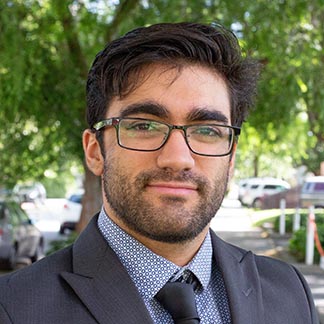Campus News
Sergio Mendez Vargo
Sergio Mendez Vargo always knew he wanted to be in the sciences but wasn’t sure what branch.

Sergio Mendez Vargo always knew he wanted to be in the sciences but wasn’t sure what branch.
Chemistry was his first topic that came easy so he thought he would study to be a chemist when he enrolled in Palomar College in San Marcos in San Diego County. But then he took a physics class and really liked it. In the course, he studied electricity and magnetism and did experiments.
His last semester in community college, he took a class in materials engineering and another in electrical engineering. As he prepared to transfer to a university, he applied to some schools for materials engineering and others for electrical engineering. He was delighted when UC Santa Cruz accepted him in its electrical engineering program.
It’s a journey he never could have predicted.
“Three years ago, I never even considered electrical engineering,” he said.
Mendez Vargo, 23, grew up in Spain with an American mother and a Spanish father. Once Mendez Vargo finished high school, his whole family decided to move to California, where his mother was raised. Though he had learned English from his mother and school, it was a bit of shock for him to learn that he and his family had a rather thick Spanish accent.
“For us, we were so American!” he said.
He has enjoyed his experiences at UC Santa Cruz and his affiliation with Rachel Carson College. Though as a transfer student, he didn’t live at the college, he did resonate with Carson’s message of “pushing for a more sustainable future that includes the well-being of our environment in our decision-making.”
He also enjoyed participating in a UC Santa Cruz study-abroad program in Brazil. After taking a year of Portuguese language classes, he visited the country in 2018, taking computer and electrical engineering related courses there while continuing to improve his language skills.
Though initially he thought he would enter the workforce right after getting his degree, he has decided to pursue a Ph.D. at Carnegie Mellon University in Pittsburgh. He came to that decision after working as an intern at Analog Devices, a tech company in Santa Clara, last summer and seeing that most of the people he worked with had doctoral degrees.
“The field has developed so much in the last 50 years that in order to keep pushing technology a step further, you want to have four more years of study and research,” he said.